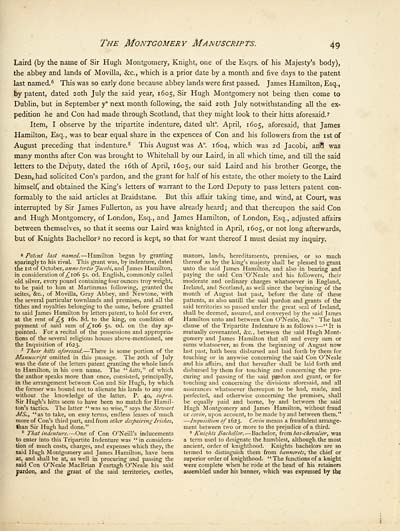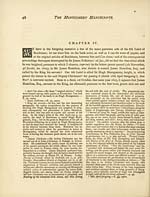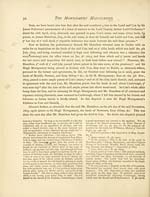Montgomery manuscripts
(63) Page 49
Download files
Complete book:
Individual page:
Thumbnail gallery: Grid view | List view

The Montgomery Manuscripts.
49
Laird (by the name of Sir Hugh Montgomery, Knight, one of the Esqrs. of his Majesty's body),
the abbey and lands of Movilla, &c, which is a prior date by a month and five days to the patent
last named. 6 This was so early done because abbey lands were first passed. James Hamilton, Esq.,
by patent, dated 20th July the said year, 1605, Sir Hugh Montgomery not being then come to
Dublin, but in September y" next month following, the said 20th July notwithstanding all the ex-
pedition he and Con had made through Scotland, that they might look to their hitts aforesaid.'
Item, I observe by the tripartite indenture, dated ult°. April, 1605, aforesaid, that James
Hamilton, Esq., was to bear equal share in the expences of Con and his followers from the 1st of
August preceding that indenture. 8 This August was A . 1604, which was 2d Jacobi, anfl was
many months after Con was brought to Whitehall by our Laird, in all which time, and till the said
letters to the Deputy, dated the 16th of April, 1605, our said Laird and his brother George, the
Dean, had solicited Con's pardon, and the grant for half of his estate, the other moiety to the Laird
himself, and obtained the King's letters of warrant to the Lord Deputy to pass letters patent con-
formably to the said articles at Braidstane. But this affair taking time, and wind, at Court, was
interrupted by Sir James Fullerton, as you have already heard; and that thereupon the said Con
and Hugh Montgomery, of London, Esq., and James Hamilton, of London, Esq., adjusted affairs
between themselves, so that it seems our Laird was knighted in April, 1605, or not long afterwards,
but of Knights Bachellor9 no record is kept, so that for want thereof I must desist my inquiry.
6 Patent last named. — Hamilton began by granting
sparingly to his rival. This grant was, by indenture, dated
the 1st of October, anno tertio Jacobi, and James Hamilton,
in consideration of ^106 5s. od. English, commonly called
old silver, every pound containing four ounces troy weight,
to be paid to him at Martinmas following, granted the
scites, &c, of Movilla, Gray Abbey, and Newtone, with
the several particular townlands and premises, and all the
tithes and royalties belonging to the same, before granted
to said James Hamilton by letters patent, to hold for ever,
at the rent of £5 '6s. 8d. to the king, on condition of
payment of said sum of £106 5s. od. on the day ap-
pointed. For a recital of the possessions and appropria-
tions of the several religious houses above-mentioned, see
the Inquisition of 1623.
7 Their hitts aforesaid. — There is some portion of the
Manuscript omitted in this passage. The 20th of July
was the date of the letters patent granting the whole lands
to Hamilton, in his own name. The "hilts," of which
the author speaks more than once, consisted, principally,
in the arrangement between Con and Sir Hugh, by which
the former was bound not to alienate his lands to any one
without the knowledge of the latter. P. 40, supra.
Sir Hugh's hitts seem to have been no match for Hamil-
ton's tactics. The latter " was so wise, " says the Stewart
MS., "as to take, on easy terms, endless leases of much
more of Con's third part, and from other despairing Irishes,
than Sir Hugh had done."
8 That indenture. — One of Con O'Neill's inducements
to enter into this Tripartite Indenture was "in considera-
tion of much costs, charges, and expenses which they, the
said Hugh Montgomery and James Hamilton, have been
at, and shall be at, as well in procuring and passing the
said Con O'Neale MacBrian Feartagh O'Neale his said
pardon, and the grant of the said territories, castles,
manors, lands, hereditaments, premises, or so much
thereof as by the king's majesty shall be pleased to grant
unto the said James Hamilton, and also in bearing and
paying the said Con O'Neale and his followers, their
moderate and ordinary charges whatsoever in England,
Ireland, and Scotland, as well since the beginning of the
month of August last past, before the date of these
pattents, as also untill the said pardon and grants of the
said territories so passed under the great seal of Ireland,
shall be deemed, assured, and conveyed by the said James
Hamilton unto and between Con O'Neale, &c." The last
clause of the Tripartite Indenture is as follows : — "It is
mutually covenanted, &c, between the said Hugh Mont-
gomery and James Hamilton that all and every sum or
sums whatsoever, as from the beginning of August now
last past, hath been disbursed and laid forth by them for
touching or in anywise concerning the said Con O'Neale
and his affairs, and that hereafter shall be laid forth and
disbursed by them for touching and concerning the pro-
curing and passing of the said pardon and grant, or for
touching and concerning the divisions aforesaid, and all
assurances whatsoever thereupon to be had, made, and
perfected, and otherwise concerning the premises, shall
be equally paid and borne, by and between the said
Hugh Montgomery and James Hamilton, without fraud
or covin, upon account, to be made by and between them."
— Inquisition of 1623. Covin means a fraudulent arrange-
ment between two or more to the prejudice of a third.
9 Knights Bachetlor. — Bachelor, from bas-chevalier, was
a term used to designate the humblest, although the most
ancient, order of knighthood. Knights bachelors are so
termed to distinguish them from bannerets, the chief or
superior order of knighthood. " The functions of a knight
were complete when he rode at the head of his retainers
assembled under his banner, which was expressed by the
49
Laird (by the name of Sir Hugh Montgomery, Knight, one of the Esqrs. of his Majesty's body),
the abbey and lands of Movilla, &c, which is a prior date by a month and five days to the patent
last named. 6 This was so early done because abbey lands were first passed. James Hamilton, Esq.,
by patent, dated 20th July the said year, 1605, Sir Hugh Montgomery not being then come to
Dublin, but in September y" next month following, the said 20th July notwithstanding all the ex-
pedition he and Con had made through Scotland, that they might look to their hitts aforesaid.'
Item, I observe by the tripartite indenture, dated ult°. April, 1605, aforesaid, that James
Hamilton, Esq., was to bear equal share in the expences of Con and his followers from the 1st of
August preceding that indenture. 8 This August was A . 1604, which was 2d Jacobi, anfl was
many months after Con was brought to Whitehall by our Laird, in all which time, and till the said
letters to the Deputy, dated the 16th of April, 1605, our said Laird and his brother George, the
Dean, had solicited Con's pardon, and the grant for half of his estate, the other moiety to the Laird
himself, and obtained the King's letters of warrant to the Lord Deputy to pass letters patent con-
formably to the said articles at Braidstane. But this affair taking time, and wind, at Court, was
interrupted by Sir James Fullerton, as you have already heard; and that thereupon the said Con
and Hugh Montgomery, of London, Esq., and James Hamilton, of London, Esq., adjusted affairs
between themselves, so that it seems our Laird was knighted in April, 1605, or not long afterwards,
but of Knights Bachellor9 no record is kept, so that for want thereof I must desist my inquiry.
6 Patent last named. — Hamilton began by granting
sparingly to his rival. This grant was, by indenture, dated
the 1st of October, anno tertio Jacobi, and James Hamilton,
in consideration of ^106 5s. od. English, commonly called
old silver, every pound containing four ounces troy weight,
to be paid to him at Martinmas following, granted the
scites, &c, of Movilla, Gray Abbey, and Newtone, with
the several particular townlands and premises, and all the
tithes and royalties belonging to the same, before granted
to said James Hamilton by letters patent, to hold for ever,
at the rent of £5 '6s. 8d. to the king, on condition of
payment of said sum of £106 5s. od. on the day ap-
pointed. For a recital of the possessions and appropria-
tions of the several religious houses above-mentioned, see
the Inquisition of 1623.
7 Their hitts aforesaid. — There is some portion of the
Manuscript omitted in this passage. The 20th of July
was the date of the letters patent granting the whole lands
to Hamilton, in his own name. The "hilts," of which
the author speaks more than once, consisted, principally,
in the arrangement between Con and Sir Hugh, by which
the former was bound not to alienate his lands to any one
without the knowledge of the latter. P. 40, supra.
Sir Hugh's hitts seem to have been no match for Hamil-
ton's tactics. The latter " was so wise, " says the Stewart
MS., "as to take, on easy terms, endless leases of much
more of Con's third part, and from other despairing Irishes,
than Sir Hugh had done."
8 That indenture. — One of Con O'Neill's inducements
to enter into this Tripartite Indenture was "in considera-
tion of much costs, charges, and expenses which they, the
said Hugh Montgomery and James Hamilton, have been
at, and shall be at, as well in procuring and passing the
said Con O'Neale MacBrian Feartagh O'Neale his said
pardon, and the grant of the said territories, castles,
manors, lands, hereditaments, premises, or so much
thereof as by the king's majesty shall be pleased to grant
unto the said James Hamilton, and also in bearing and
paying the said Con O'Neale and his followers, their
moderate and ordinary charges whatsoever in England,
Ireland, and Scotland, as well since the beginning of the
month of August last past, before the date of these
pattents, as also untill the said pardon and grants of the
said territories so passed under the great seal of Ireland,
shall be deemed, assured, and conveyed by the said James
Hamilton unto and between Con O'Neale, &c." The last
clause of the Tripartite Indenture is as follows : — "It is
mutually covenanted, &c, between the said Hugh Mont-
gomery and James Hamilton that all and every sum or
sums whatsoever, as from the beginning of August now
last past, hath been disbursed and laid forth by them for
touching or in anywise concerning the said Con O'Neale
and his affairs, and that hereafter shall be laid forth and
disbursed by them for touching and concerning the pro-
curing and passing of the said pardon and grant, or for
touching and concerning the divisions aforesaid, and all
assurances whatsoever thereupon to be had, made, and
perfected, and otherwise concerning the premises, shall
be equally paid and borne, by and between the said
Hugh Montgomery and James Hamilton, without fraud
or covin, upon account, to be made by and between them."
— Inquisition of 1623. Covin means a fraudulent arrange-
ment between two or more to the prejudice of a third.
9 Knights Bachetlor. — Bachelor, from bas-chevalier, was
a term used to designate the humblest, although the most
ancient, order of knighthood. Knights bachelors are so
termed to distinguish them from bannerets, the chief or
superior order of knighthood. " The functions of a knight
were complete when he rode at the head of his retainers
assembled under his banner, which was expressed by the
Set display mode to:
![]() Universal Viewer |
Universal Viewer | ![]() Mirador |
Large image | Transcription
Mirador |
Large image | Transcription
Images and transcriptions on this page, including medium image downloads, may be used under the Creative Commons Attribution 4.0 International Licence unless otherwise stated. ![]()
| Histories of Scottish families > Montgomery manuscripts > (63) Page 49 |
|---|
| Permanent URL | https://digital.nls.uk/95233683 |
|---|
| Description | A selection of almost 400 printed items relating to the history of Scottish families, mostly dating from the 19th and early 20th centuries. Includes memoirs, genealogies and clan histories, with a few produced by emigrant families. The earliest family history goes back to AD 916. |
|---|

